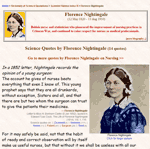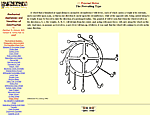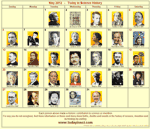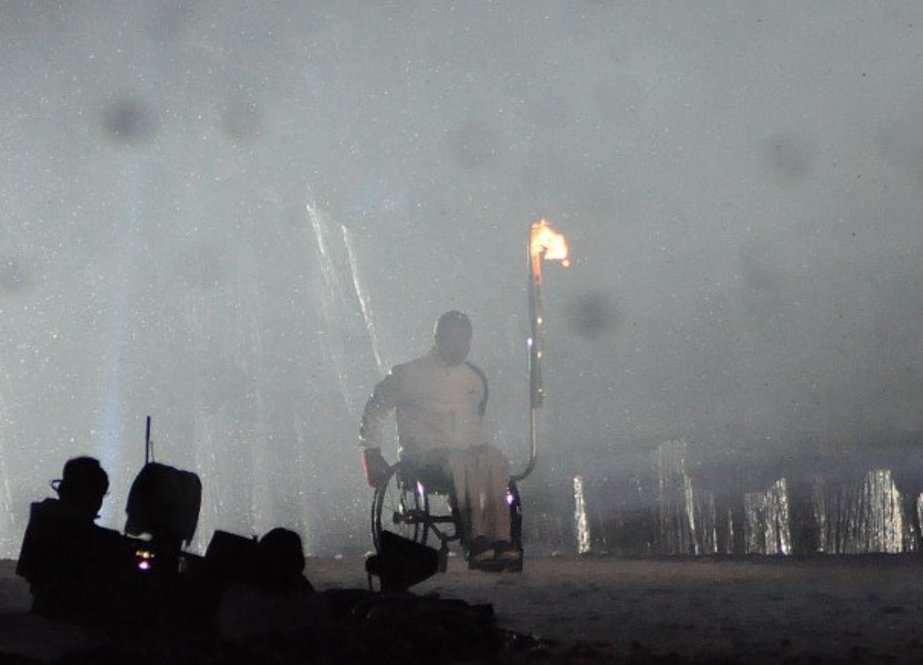More FIX on the NET @ FIX University Cultural Campus
Welcome to Spring Semester 2013
The Best College Radio Stations
Today In Science
History
 ©
©
The people and events
of today
Click
image background or title to go to Today's page.
Click on an individual to go
to that person's birth date.
 Science Quotes Index - by
Science Quotes Index - by
Name
Albert
Einstein: I used to wonder how it comes about that the electron is negative.
Negative-positive—these are perfectly symmetric in physics. There is no reason
whatever to prefer one to the other. Then why is the electron negative? I
thought about this for a long time and at last all I could think was “It won the
fight!” ... (more)
Science Quotes
Index - by Topic
Atomic
Bomb: I have always fancied that the end of the world will be when some
enormous boiler, heated to three thousand millions of atmospheric pressure,
shall explode and blow up the globe. ... They [the Americans] are great
boilermakers. — Jules Verne (1863). ... (more)
 Short
Short
Stories of Science and Invention
Weekly,
from September 1942 to July 1945, Charles F. Kettering (who invented the first
automobile self-starter) gave five-minute intermission talks about Science and
Invention during the radio broadcasts of the General Motors Symphony of the Air.
These radio talks are a fascinating legacy from the mind of a prolific inventor.
... (more)
 Stories About Chemistry
Stories About Chemistry
Henning
Brand's “Philosopher's Stone”: There once lived in the Middle Ages in the
German town of Hamburg a merchant by the name of Hennig Brand. We do not know
how inventive he was in his trade operations, but can assert confidently that he
had only a very crude idea of chemistry...
One fine evening the former
merchant had a streak of luck. A substance, white as snow, settled at the bottom
of his retort. It burned quickly, forming thick asphyxiating fumes. And the
strangest thing was that it glowed in the dark. The cold light it gave off was
so bright that Brand could read his ancient alchemical treatises by it (for him
these treatises had now taken the place of business letters and receipts). ... (more)
 Perpetual
Perpetual
Motion
Introduction:
The history of the search for perpetual motion does not afford a single instance
of ascertained success; all that wears any appearance of probability remains
secret, and like other secrets, can not be defended in any satisfactory way
against the opinions of the skeptical, who have in their favor, in this
instance, an appeal to learned authorities against the principle of all such
machines, and the total want of operativeness in all known practical results.
Published statements afford sorry examples of talents and ingenuity strangely
misapplied. Some, but very few, are slightly redeemed from contempt by a glimpse
of novelty. Of genius all are deficient, and the reproductions of known
fallacies show a remarkable ignorance of first principles on one side and of the
most ordinary sources of information on the other. ... (more)
 Today in Science History
Today in Science History
Quiz
In
the margin of most pages, there is a multiple-choice quiz. Each page has a
question served randomly from the database. Although there are some easy
questions, others are designed to be challenging — to make you think. If you
pick the right answer, congratulations. Three times in a row you can be very
proud. Some questions should leave you feeling you found out something you
hadn't thought about very much before. Enjoy! ... (more)
 Today
Today
in Science History Newsletter
Sign
up for the email newsletter, and you will receive a daily dose of the science
events and people for that day. Each newsletter may include a description and
link to a feature article, some quotations from the scientists born or died on
the day, and some quiz questions. Some days the scientist names or events are
very familiar, and the questions are easier. Other days, the questions should
raise your interest in knowning about the lesser known scientists. The answers
are online if you are impatient, or they also come in the next day's newsletter.
... (more)
 Today in Science History Wall
Today in Science History Wall
Calendars
You
can print out a calendar page for each month of the year which has a thumbnail
picture of a scientist on each day. Usually it will be on the person's birth
day, though some are on the date of death. Occasionally, an event is featured in
the picture. ... (more)
History
 ©
©The people and events
of today
Click
image background or title to go to Today's page.
Click on an individual to go
to that person's birth date.
 Science Quotes Index - by
Science Quotes Index - byName
Albert
Einstein: I used to wonder how it comes about that the electron is negative.
Negative-positive—these are perfectly symmetric in physics. There is no reason
whatever to prefer one to the other. Then why is the electron negative? I
thought about this for a long time and at last all I could think was “It won the
fight!” ... (more)
Science Quotes
Index - by Topic
Atomic
Bomb: I have always fancied that the end of the world will be when some
enormous boiler, heated to three thousand millions of atmospheric pressure,
shall explode and blow up the globe. ... They [the Americans] are great
boilermakers. — Jules Verne (1863). ... (more)
 Short
ShortStories of Science and Invention
Weekly,
from September 1942 to July 1945, Charles F. Kettering (who invented the first
automobile self-starter) gave five-minute intermission talks about Science and
Invention during the radio broadcasts of the General Motors Symphony of the Air.
These radio talks are a fascinating legacy from the mind of a prolific inventor.
... (more)
 Stories About Chemistry
Stories About ChemistryHenning
Brand's “Philosopher's Stone”: There once lived in the Middle Ages in the
German town of Hamburg a merchant by the name of Hennig Brand. We do not know
how inventive he was in his trade operations, but can assert confidently that he
had only a very crude idea of chemistry...
One fine evening the former
merchant had a streak of luck. A substance, white as snow, settled at the bottom
of his retort. It burned quickly, forming thick asphyxiating fumes. And the
strangest thing was that it glowed in the dark. The cold light it gave off was
so bright that Brand could read his ancient alchemical treatises by it (for him
these treatises had now taken the place of business letters and receipts). ... (more)
 Perpetual
PerpetualMotion
Introduction:
The history of the search for perpetual motion does not afford a single instance
of ascertained success; all that wears any appearance of probability remains
secret, and like other secrets, can not be defended in any satisfactory way
against the opinions of the skeptical, who have in their favor, in this
instance, an appeal to learned authorities against the principle of all such
machines, and the total want of operativeness in all known practical results.
Published statements afford sorry examples of talents and ingenuity strangely
misapplied. Some, but very few, are slightly redeemed from contempt by a glimpse
of novelty. Of genius all are deficient, and the reproductions of known
fallacies show a remarkable ignorance of first principles on one side and of the
most ordinary sources of information on the other. ... (more)
 Today in Science History
Today in Science HistoryQuiz
In
the margin of most pages, there is a multiple-choice quiz. Each page has a
question served randomly from the database. Although there are some easy
questions, others are designed to be challenging — to make you think. If you
pick the right answer, congratulations. Three times in a row you can be very
proud. Some questions should leave you feeling you found out something you
hadn't thought about very much before. Enjoy! ... (more)
 Today
Todayin Science History Newsletter
Sign
up for the email newsletter, and you will receive a daily dose of the science
events and people for that day. Each newsletter may include a description and
link to a feature article, some quotations from the scientists born or died on
the day, and some quiz questions. Some days the scientist names or events are
very familiar, and the questions are easier. Other days, the questions should
raise your interest in knowning about the lesser known scientists. The answers
are online if you are impatient, or they also come in the next day's newsletter.
... (more)
 Today in Science History Wall
Today in Science History WallCalendars
You
can print out a calendar page for each month of the year which has a thumbnail
picture of a scientist on each day. Usually it will be on the person's birth
day, though some are on the date of death. Occasionally, an event is featured in
the picture. ... (more)

